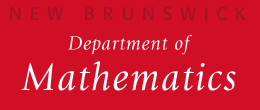A brief explanation for the ranking methodology in the recent National Research Council Study of Graduate Programs
|
Mathematics Graduate Program |
It collects data on 20 characteristics that,
when appropriately weighted for their relative importance in contributing to a high-quality
program, would serve as a basis for ranking programs.
The survey-based rankings
are based on faculty survey responses in each field to obtain their assigned importance to
the 20 characteristics. The collected program data are then randomly
perturbed and standardized, the surveyed weights also go through statistical treatment
and then are randomly drawn 500 times. Each such randomly drawn weight is combined with
the perturbed and standardized program data to produce a ranking. This results in
500 rankings for each program. Finally the top and bottom 5% of the rankings are removed
and the 5th and 95th percentile rankings are published.
The regression-based rankings depend on the weights calculated from the faculty ratings
of a sample of programs in their field. These ratings were related through a
multiple regression analysis to the 20 characteristics. The resulting weights were then
applied to the perturbed and standardized data to produce rankings in the same way as
the survey-based method.
Here contains a detailed description by NRC of its ranking methodology.








